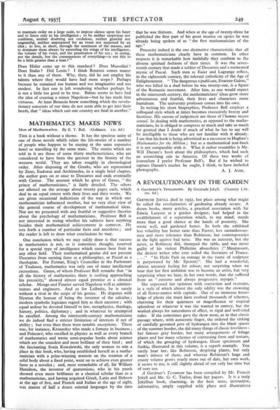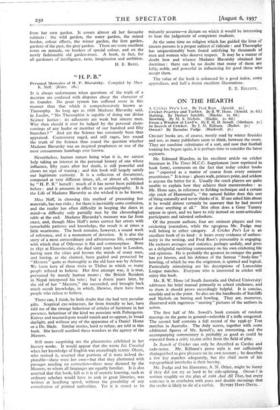A REVOLUTIONARY IN THE GARDEN
GERTRUDE JEKYLL died in 1932, her place among what might be called the revolutionists of gardening already secure. A dozen books, many articles, a practical association with Sir Edwin Lutyens as a garden designer, had helped in the establishment of a reputation which, to my mind, stands more than a good chance at the hands of posterity. She wrote well, and gardened better. In both she exhibited less volatility but better taste than Farrer, less cantankerous- ness and more tolerance than Robinson, her contemporaries in the fight against bad taste. She was an autocrat, but she never, as Robinson did, thumped the table, and was never guilty of his violent Philistine absurdities (" Maupassant, the dirtiest writer who ever soiled the literature of France. . . ." " In Hyde Park an outrage in the name of sculpture is perpetrated by Mr. Epstein)". She had a wonderful, almost uncanny feeling for colour, not surprising when we hear that her first ambition was to become an artist, but very surprising when we hear, in her own words, that she suffered from an " extreme and always progressive myopia."
She expressed her opinions with conviction and restraint, in a style of which almost the only oddity was the crowning of all flower-names with capitals. Out of an immense know- ledge of plants she must have evolved thousands of schemes, charming for their quietness or magnificence or tropical splendour or whatever it was she wanted to convey, but she worked always for naturalness of effect, to rigid and well-tried rules. If she sometimes gave the show away, as in that classic passage where, with autocratic finger, she ordered the sinking of carefully groomed pots of hydrangea into the blank spaces ofthe summer border, she didmany things of classic loveliness : her famous grey border, her many arrangements of foliage plants and her many schemes of contrasting form and texture, of which the grouping of hydrangea, lilium speciosum and funkia, illustrated in this volume, is a superb example. You rarely hear her, like Robinson, despising plants, but only man's misuse of them, and whereas Robinson's huge and crusty volume grows yearly more out of date, her own work, it seems to me, is still slightly ahead of not only her time but of ours too.
A Gardener's Testament has been compiled by Mr. Francis Jekyll and Mr. G. C. Taylor, from her papers. It is a truly Jekyllian book, charming, in the best taste, instructive, informative, amply supplied with plans and illustrations from her own garden. It covers almost all her favourite subjects : the wild garden, the water garden, the mixed border, colour effects, the winter garden, the fern garden, gardens of the past, the grey garden. There are some excellent notes on annuals, on borders of special colour, and on the newly fashionable old garden-roses. A book, in fact, for all gardeners of intelligence, taste, imagination and ambition.
H. E. BATES.







































 Previous page
Previous page